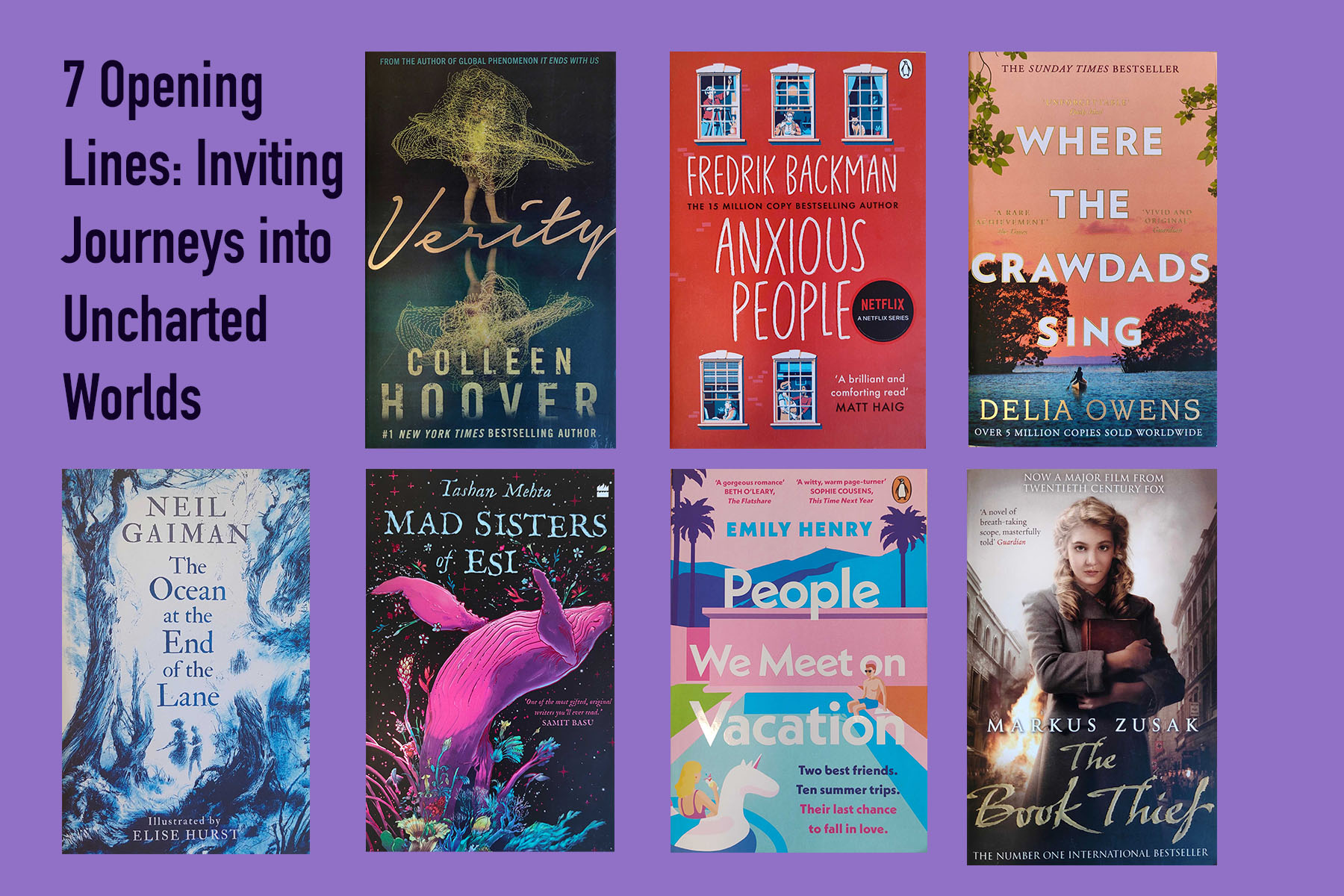
Embarking on a literary journey is like entering a doorway that leads to unexplored realms of imagination and emotion. It’s a journey that often begins with the captivating allure of a novel’s opening lines, serving as a portal into the intricate tapestry of narratives that unfold within the pages. These initial words possess a unique power, setting the tone for the odyssey that lies ahead. In this curated collection, we invite you to join us as we traverse the enchanting beginnings of some literary masterpieces—each a world unto itself, waiting to be discovered.
- “The Book Thief” by Markus Zusak
Against the tumultuous backdrop of Nazi Germany, Markus Zusak’s “The Book Thief” beckons readers with a poignant revelation. Through these words, narrated by Death, we are ushered into Liesel’s world, where stolen books become symbols of solace and courage amid the chaos of war. Zusak’s introduction not only sets the stage for a historical narrative but also hints at the transformative power of literature during challenging times.
This is how Zusak draws the reader in:
“First the colors. Then the humans. That’s usually how I see things. Or at least, how I try.” - “The Ocean at the End of the Lane” by Neil Gaiman
Neil Gaiman, a virtuoso of the fantastical, invites readers to explore magic and nostalgia in “The Ocean at the End of the Lane. The protagonist’s reflection on uncomfortable attire—foreshadows a narrative where the boundaries between reality and fantasy blur. Gaiman’s introduction not only alludes to childhood enchantment but also teases a journey where the extraordinary and the ordinary coalesce.
Here’s what Gaiman wrote:
“I wore a black suit and a white shirt, a black tie and black shoes, all polished and shiny: clothes that normally would make me feel uncomfortable, as if I were in a stolen uniform, or pretending to be an adult.” - “Where the Crawdads Sing” by Delia Owens
Delia Owens invites us to the atmospheric marshes of North Carolina in “Where the Crawdads Sing.” The vivid imagery sets the stage for a coming-of-age story woven seamlessly with a mysterious undercurrent. Owens’ introduction not only introduces us to a unique ecological setting but also serves as a metaphor for the resilience of the human spirit against the currents of loneliness and abandonment.
This is what Ms Owens started her book with:
“Marsh is not swamp. Marsh is a space of light, where grass grows in water, and water flows into the sky.” - “Mad Sisters of Esi” by Tashan Mehta
Tashan Mehta’s “Mad Sisters of Esi” unfolds in the cosmic expanse guarded by Myung, promising a journey filled with learning, stories, and dreams across three distinct realms. Myung’s quest to leave her celestial charge poses a profound question: “In the big, wild world, what will you decide to keep close?” Fueled by the mantra “I handle my fear by fleeing from it,” the tale promises an odyssey of cosmic proportions. Mehta’s introduction tantalizes with the promise of intergalactic adventures and sets the stage for philosophical exploration.
Tashan’s opening line for her book:
“I handle my fear by fleeing from it.” - “People We Meet on Vacation” by Emily Henry
Emily Henry’s romantic comedy, “People We Meet on Vacation,” opens with a declaration that encapsulates the essence of the story: “On vacation, you can be anyone you want.” This line sets the stage for the delightful exploration of friendship and love as Poppy and Alex embark on yearly adventures, testing the boundaries of their relationship against the spontaneity of vacation life.
Ms Henry takes you on a vacation with these lines:
“On vacation, you can be anyone you want.” - “Anxious People” by Fredrik Backman
Fredrik Backman takes a humorous and poignant approach in “Anxious People,” as a failed bank robbery transforms into an unlikely hostage situation. The gripping opening lines thrust readers into a narrative where missteps and connections converge, revealing the profound interconnectedness of seemingly disparate lives. Backman’s introduction tickles our funny bones while laying the groundwork for a compassionate exploration of the human condition:
“A bank robbery, a hostage drama, a stairwell full of police officers on their way to storm an apartment. It was easy to get to this point, much easier than you think. All it took was one single really bad idea”. - “Verity” by Colleen Hoover
Colleen Hoover’s thriller, “Verity,” delves into the twisted world of author Verity Crawford, concealing sinister secrets beneath the veneer of literary success. The chilling revelation sets the stage for a psychological thriller where confessions become the key to unraveling the dark truths hidden within the folds of an author’s manuscript. Hoover’s introduction propels us into the gripping realm of suspense and prompts reflection on the blurred lines between reality and fiction, morality, and manipulation:
“I hear the crack of his skull before the spattering of blood reaches me”.
As we embark on this literary odyssey, these introductory lines not only serve as invitations but also as glimpses into worlds where the ordinary and the extraordinary intertwine. These stories are not just about plots; they are invitations to explore the complexities of the human experience, to grapple with universal themes, and to emerge from the journey with hearts and minds expanded by the transformative power of literature. Join us as we navigate these uncharted waters, discovering the magic woven into the fabric of storytelling.
Walk into your nearest Kunzum bookstore to read them or Whatsapp +91.8800200280 to order. Buy the book(s) and the coffee’s on us.
